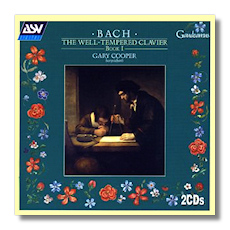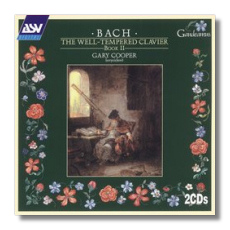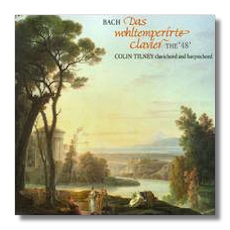
The Internet's Premier Classical Music Source
Related Links
Recommended Links
Site News
Johann Sebastian Bach
Performances of "Well-Tempered Clavier"
Book I, Part 1
With the arrival of my copy of Book I performed by Gary Cooper on AS&V, I'm all set to review these seventeen versions:
Mieczysław Horszowski – Vanguard 8046/7 Sergey Schepkin – Ongaku 024-113 Jenő Jandó – Naxos 8.553796/7 Keith Jarrett – ECM 1362/3 (Universal 835246-2) Edwin Fischer – EMI 67214 Bernard Roberts – Nimbus 5608/11 Rosalyn Tureck – Deutsche Grammophon 463305 Glenn Gould – Sony 42266 (52600,52603) András Schiff – Decca 414388 Friedrich Gulda – Philips 446545 Edward Aldwell – Nonesuch 79272 Angela Hewitt – Hyperion 67301/2 Masaaki Suzuki – BIS 813/14 Sviatoslav Richter – Russian Revelation 20003 Gustav Leonhardt – EMI 49126 (also DHM 77011) Colin Tilney – Hyperion 66351/4 Gary Cooper – Academy Sound & Vision 251
And who is Gary Cooper? Fair question. Mr. Cooper has been a member of the ensemble Sonnerie since 1992. Not long ago, AS&V released a 2CD set of all the Rameau Cantatas directed by Cooper. As you would expect, his performance of Book I is on harpsichord. Suzuki and Leonhardt give the other harpsichord performances. Tilney uses the clavichord for Book I of his set, the harpsichord for Book II. I reviewed quite a few of the above artists in their performances of Book II many months ago. Without delving much into history, I just want to emphasize that none of them was without merit (I kept them all) and Tureck was at the top of my list. For Book I, I expect to hear many wonderful interpretations. The competition is heavy and loaded with superb musicians. For this review project, I'll be listening in random order groupings of 6-6-5; just trying to make this more manageable for myself. You won't notice anything different.
Prelude in C Major – Starting off a body of works with music having an element of 'scale playing' is something Bach also did with his Suites for Unaccompanied Cello. Of course, if you feel you're listening to a series of scales being played, the artist is not doing right by you. This is superior music having the properties to easily take the listener to a new world where everything is gentle and precise/ordered. I think that order is generally a major aspect of Bach's compositions, and it comes through loud and clear in the C major Prelude.
None of the versions is less than enjoyable, but the following only provide enjoyment: Leonhardt, Schepkin, Fischer, Horszowski, Cooper, Schiff, Roberts, and Jando. Fischer times in at less than 1 ½ minutes; average time is a little over two minutes. I think it's just too fast. Cooper is very slow at almost 3 minutes and doesn't put a great deal of feeling into the music; Tureck's equally slow reading uncovers Cooper's problem.
Richter is a step up and likely would be even higher except for a sound problem. There's hiss, indoor and outdoor noise, and a generally high level of aural debris. That's a lot to deal with, and his performance can't quite overcome it.
Suzuki, Tilney, Jarrett, and Hewitt are excellent. Tilney's clavichord is a great instrument for conveying gentleness, and Tilney is highly expressive. This strongly legato music is right up Jarrett's alley, although I wish he had put more emotion into it. Both Suzuki and Hewitt deliver commendable mainstream accounts.
Edward Aldwell and Glenn Gould are outstanding. Aldwell, like Jarrett, is a match for the music. Unlike Jarrett, Aldwell is expansive and slower, quite dream-like. His version successfully transports me to other lands. Gould uses a delectable mix of staccato and legato with precise phrasing.
Rosalyn Tureck and Friedrich Gulda share top honors with thoroughly transcendent interpretations. Tureck's version has the expansiveness of Aldwell's along with a blend of precision and beauty second to none. Gulda, in Bach, always has his sights on the finish line; his sense of forward momentum can rival Gould's. So it is with his C Major Prelude. From the beginning, he is seeking resolution. I get assurance from Gulda and the most uplifting performance of all the versions.
Fugue in C Major – Stretto is what makes this fugue tick, the counterpoint is a marvel to experience, and the sensation of inevitability is rock-solid. None of these features is highly evident with Tilney, Cooper, Hewitt, or Schepkin. Tilney doesn't dig deeply enough. Cooper's slow reading is pedestrian. Hewitt's way with staccato is irritating, and Schepkin decides to speed up for no reason and gets too loud as the fugue progresses. Fischer is a step up in performance, but he indulges in some key-banging and the harsh sound exacerbates the situation. Speaking of harsh, Leonhardt gives the fugue a somewhat harsh aura which reduces my enjoyment.
Very good versions which well display the stretto/counterpoint and possess fine forward momentum come from Jandó. Gulda, Schiff, and Suzuki. Gulda is not a mainstream Bach artist. Among other things, he often uses what would be considered extreme tempos at both ends. With the C Major Fugue, he employs a very slow tempo, the slowest of the seventeen versions. It does work well, and Gulda keeps the momentum going. But I think that Tureck's almost as slow tempo is just within my comfort range.
These are the excellent performances. Aldwell has great momentum and beauty, Jarrett is quick and seamless, Horszowski is fully idiomatic, Tureck is very slow with great emphasis on counterpoint, and Roberts provides the most lovely reading.
The outstanding readings come from Richter and Gould. Both are always striving toward inevitability, and they capture it fully. That Richter does this at a slow tempo is very impressive. Gould is quicker and more dynamic.
Prelude in C minor – In my review of Schepkin's WTC 1 over a year ago, I characterized the C minor Prelude as wild, demonic, and intense music perfectly performed by Schepkin. I still hold those opinions except that, compared to Gould, Schepkin is not particularly creative. Gould uses a somewhat staccato approach with slow to moderate pacing and conjures up a sinister imagery which makes this version very powerful and special.
Joining Schepkin's high level are Richter, Fischer, Jarrett, Aldwell, Jandó. Tureck, Cooper, Horszowski, Leonhardt, Suzuki, and Gulda. These are all terrific performances. Richter and Fischer are very fast and display superb technical application. Gulda's very slow reading is quite distinctive.
At a lower level are Tilney, Hewitt, and Roberts. There are many good features of the clavichord, but I don't think it matches up well with this prelude's moods; also, Tilney drags the pace some. Hewitt is often too soft-toned for my tastes, and Roberts has a hesitation in his pacing which eventually retards the music's momentum.
András Schiff is my least rewarding version. He largely removes all traces of wildness, intensity, and demonic images; he tames the music, making it pretty. It's nice to listen to, but that's not enough.
Fugue in C minor – A three-voice fugue with invertible counterpoint; a sensation of petulance hangs in the air. Every version is rewarding including Tilney and Gulda who clock in at over 2 minutes; average time is a little over 1 ½ minutes. Hewitt, Tureck, and Richter are my preferred readings. Hewitt uses legato beautifully, Tureck is the most expansive, and Richter provides a powerful and incisive interpretation.
Prelude in C sharp major – This two-part invention glitters with youthful joy and can also express urgency, mystery, and even a sinister quality. I have Horszowski and Gould at the bottom; Horszowski sounds like two pianists not entirely in-sync, and Gould is simply too fast to allow the emotions to emerge.
Schiff, Tilney, and Roberts have no trouble conveying the youthful energy and joy, but that's as far as they go. Other emotions are neglected.
The following versions are quick and well express the music's urgency and joy: Suzuki, Gulda, Richter, Fischer, Jarrett, Jandó. Schepkin, and Aldwell. Fischer's sound has an under-water effect, but decreasing bass response will minimize the problem. Great performances come from Hewitt and Tureck. Hewitt intersperses a hushed and plush atmosphere with powerfully poetic passages. Tureck is stark and incisive.
Two slow-tempo harpsichord performances, Cooper and Leonhardt, are the outstanding issues. They both glitter superbly with urgency oozing inward. Leonhardt's is the most youthful performance, and Cooper brings a deliciously sinister quality.
Fugue in C sharp minor – Youthful joy continues but with an element of nostalgia as the summer ends and school bells ring. Horszowski has some problems with providing a firm architecture; switch to Gulda to witness a perfectly formed fugue. Fischer, not slow, drags at time when he loses momentum. Hewitt, Gould, Roberts, Aldwell, Richter, Jandó. Jarrett, and Schepkin give excellent and quick performances; Schepkin is particularly nostalgic. At over 3 minutes, Cooper is very slow and the listener gets to savor the music; some youthfulness is sacrificed. Leonhardt, also over three minutes, highlights the counterpoint and does not sacrifice youthful urges. The same applies to Tilney. Suzuki is quicker but no less rewarding. Tureck is slow paced and excellent.
Schiff and Gulda present transcendent interpretations. Schiff's is an exquisitely delicate and expansive reading of strong nostalgia. Every decision he makes adds to the sensation of taking a journey to pristine lands not yet touched by human debris. Gulda is just the opposite; he's on a straight track of invincibility. His mix of staccato and legato is superb, and the counterpoint is so interesting. His build-up and release of tension toward the conclusion is the best I've ever heard.
Prelude in C sharp minor – This is reflective music of exquisite sadness. Jarrett's very quick and smooth performance is quite pleasurable but never gets close to the music's core. Leonhardt, Schepkin, Roberts, Cooper, Horszowski, Hewitt, and Aldwell don't bring out the intensity or variety of emotions as well as the best versions. And there are plenty of 'best' versions which are outstanding: Suzuki, Jandó. Richter, Gulda, Gould, Schiff, Tilney, and Fischer. Each reaches the heart of the music's intensity of sadness. Tilney, Suzuki, and Schiff are the most expansive; Tilney's tangy clavichord is a match for the moods of this prelude. Schiff's pacing and tempo changes are wonderful. Pride of place goes to Rosalyn Tureck; her very slow reading captures every nuance, and she brings a strong sense of urgency to the prelude.
Fugue in C sharp minor – This five-part fugue continues the sadness of the C sharp minor Prelude but in an increasingly demonstrative manner as the harmonic density intensifies. I liken it to a journey to death with an understanding of the arbitrary nature of it all. The Prelude contemplates; the Fugue acts. There's great tension, urgency, beauty, and complete resignation; the conclusion to this fugue really does spell "the end".
Many of the versions are wonderful: Tureck, Schepkin, Richter, Horszowski, Hewitt, Fischer, Gulda, Leonhardt, Suzuki, Schiff, and Aldwell. Although Tureck and Hewitt are very slow at over 5 minutes, Richter savors and puts the music through a microscope for over 6 minutes. His command is supreme, and I feel he opens the core of the music up more than any other artist. His is my favorite interpretation. The remaining six versions are very good; they just don't quite possess the majesty or depth of the best performances.
Update: The high quality of these performances is very impressive. The least rewarding issues, Roberts and Tilney, are still very fine listening experiences. So far, I have Tureck in front closely followed by Richter, Gulda, and Gould. Yes, none of the four presents wonderful sound, but excepting for Tureck, each is essentially vivid/crisp and more than capable of highlighting counterpoint. Tureck's the one who has to often overcome some messy sound, and she always does. Fischer shares this challenge but isn't quite as successful.
Copyright © 2000, 2001 by Don Satz.
















